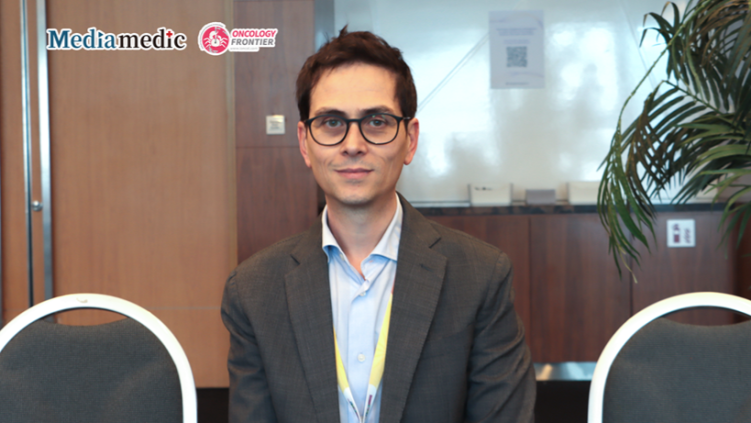Mediamedic shared a post on LinkedIn:
“ESMO Asia 2024, Jordi Remon Masip Highlights Key Thoracic Oncology Studies.
The thoracic oncology session at the 2024 ESMO Asia Annual Meeting featured prominent oral presentations, focusing on thymic tumors and non-small cell lung cancer (NSCLC).
Key studies included the Phase II MARBLE trial (Abstract LBA8) evaluating atezolizumab combined with carboplatin/paclitaxel for metastatic or recurrent thymic carcinoma and the Phase II AL3810-202 trial (Abstract 6250) assessing Lucitanib (Delitinib, AL3810) as a second-line or subsequent therapy for advanced recurrent or metastatic thymic carcinoma.
Key Study Insights
MARBLE Trial
The multicenter, single-arm, open-label Phase II MARBLE trial enrolled 48 patients with metastatic or recurrent thymic carcinoma who had not received prior chemotherapy. Patients were treated with atezolizumab combined with carboplatin and paclitaxel. The trial reported:
Objective Response Rate (ORR): 56.3% (27 patients achieved partial response).
Median Progression-Free Survival (mPFS): 9.6 months.
Median Overall Survival (mOS): Not reached.
Adverse Events: 77.1% experienced Grade ≥3 adverse events.
Compared with historical controls, the regimen demonstrated higher efficacy with manageable safety concerns.
AL3810-202 Trial
This randomized, controlled Phase II trial involved the largest global cohort of thymic carcinoma patients to date (n=68). It evaluated Lucitanib against placebo for second-line or later treatment. Key findings include:
Investigator-assessed mPFS: 6.6 months for the Lucitanib group versus 1.9 months for the placebo group (P=0.0306; HR=0.53).
IRC-assessed mPFS: 5.8 months for Lucitanib versus 3.7 months for placebo (P=0.1050; HR=0.60).
Statistical Validation: Weighted log-rank tests, restricted mean survival time analysis, and Bayesian analysis all indicated significant advantages for the Lucitanib group.
Jordi Remon Masip, from the Institut Gustave Roussy in France, provided his expert analysis of these groundbreaking studies for Oncology Frontier.
Oncology Frontier: At the 2024 ESMO Asia meeting, the MARBLE and AL3810-202 trials released new data on first-line and second-line treatments for thymic carcinoma. Could you share your thoughts on these findings?
Dr. Remon: The results of the MARBLE trial highlight the efficacy of atezolizumab combined with carboplatin and paclitaxel as a first-line treatment for advanced thymic carcinoma. With an ORR of 56.3% and an mPFS of 9.6 months, these are promising outcomes. However, the key challenge is identifying patients who benefit more from starting with chemoimmunotherapy compared to carboplatin/paclitaxel chemotherapy alone. For these patients, sequential treatment options such as immunotherapy combined with anti-angiogenic agents could be considered.
MARBLE is undoubtedly an important clinical trial. Yet, it is essential to pinpoint the subgroup of patients who derive the greatest benefit from first-line chemoimmunotherapy while remaining vigilant about potential toxicities. Notably, the trial reported a 66.7% incidence of Grade ≥3 immune-related adverse events (irAEs), which warrants careful monitoring.
The second trial, AL3810-202, evaluated Lucitanib in previously treated thymic carcinoma. This trial showed positive results, as Lucitanib improved progression-free survival and reduced the risk of progression by 40% compared to best supportive care.
However, the second-line treatment landscape for thymic carcinoma already includes other anti-angiogenic agents such as sunitinib and lenvatinib, which have reported clinically meaningful results. These agents often show higher response rates and longer progression-free survival compared to Lucitanib. While the activity of Lucitanib is significant, its benefits are not outstanding compared to the existing options available in this treatment space.
Oncology Frontier: What are the emerging first-line treatment options for advanced or recurrent thymic carcinoma, given that carboplatin and paclitaxel remain the standard chemotherapy regimen?
Dr. Remon: I think chemoimmunotherapy is an interesting approach in this population, because chemotherapy works and immunotherapy works. Currently, there are at least three single arm phase 2 clinical trials, each of these trials assessing chemoimmunotherapy in advanced thymic carcinoma, that have reported a response rate of approximately 50%.
This is a similar response rate to what we can achieve with chemotherapy alone, so perhaps this is a potential strategy, but not for all patients. I think the future in first-line will be the combination of chemotherapy plus antiangiogenics plus immunotherapy to try to increase the efficacy of the chemotherapy alone.
Oncology Frontier: Which reports and research results from the 2024 ESMO Asia conference did you find most interesting?
Dr. Remon: During the oral session, we also presented the updated results regarding the activity of zongertinib, a new HER2 tyrosine kinase inhibitor, for HER2 mutant lung cancers. At the dose of 120mg, the drug reported a response rate of 75%.
We don’t have the median progression-free survival data yet, but I think in these patients, this new TKI could be relevant.
In the future, we need to discuss whether the TKIs are better than the antibody-drug conjugates that currently are already approved as the standard second-line treatment option. Indeed, another challenge to address is whether this new TKI could be moved to first-line in combination with chemotherapy.
So in the future, it will be difficult to decide the best treatment options for these patients, and several clinical trials can be conducted to try to evaluate the most appropriate first-line option in patients with HER2-mutant non-small cell lung cancer.”


